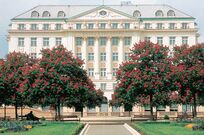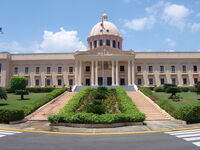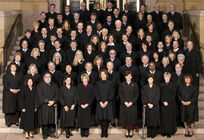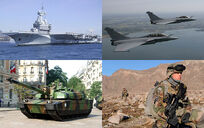
|
Outdated Template In Use! | |
| Please note that the template that you are using is outdated. This may cause issues with the template, the page and the wider Particracy Wiki! Please the current list of supported and up to date templates located here: Templates Manual of Style. If you need assistance please contact Wiki Administrator Auditorii via the in-game forums or Discord. |
| Baltusia | |
|---|---|
 
Flag Coat of Arms | |
| Motto Vivat populus de Baltusia! | |
| Anthem Run to battle! | |
 Routes map of Baltusia | |
| Capital Villita Largest city Villita | |
| Languages Luthorian | |
| Denonym Baltusian | |
| Government Presidential Republic President Clementine Attlee Prime Minister Mary Angelorum | |
| Legislature Congress | |
| GDP - Total 2,872,214,532,036 BLD - Per Capita 28,418 BLD | |
| Area 1,755,600 km² | |
| Population 99,615,392 | |
| Currency Baltusian Dollar (BLD) | |
| Drives on Right | |
| Internet TLD .bt | |
Baltusia is a democratic republic located in Northern Seleya. It borders Lodamun to the north, Kalistan to the east, Valruzia to the west and Gaduridos and Tukarali to the south.
Etymology
Baltusia has been known by a number of names, notably the 'Federal Republic of Baltusia' and the 'Workers Republic of Baltusia'. The exact origins of the name are not known exactly but it is likely to have emerged from a combination the native tribes who inhabited the area in antiquity and successive colonial regimes.
History
In 4159, Baltusia was successfully elected to Seat E on the Security Council. The resumption of the Vote Baltusia campaign was a result of worsening relations with Kalistan, the incumbent nation in Seat C.
Geography
Baltusia borders five other nations and is located in northern Seleya. It has a small area of coastline in the south-east.
Government and politics
Baltusia is a presidential republic, in which the role of the executive is fulfilled by the 'President and Commander-in-Chief', currently Brian Burgmuller of the Baltusian Republican Party. The President and Commander-in-Chief is the official Head of State and also the Head of Government. As the President is also the Head of Government, they are granted the exclusive right to present a cabinet bill. They are therefore also tasked with chairing the cabinet. All legislation must be approved by Congress, even if it originates from the executive branch.

The President and Commander-in-Chief's official residence; the Presidential Palace
The President and Commander-in-Chief is usually elected every four years, at the same time as the Baltusian Congress. Due to its importance within Baltusia's political system, it is common for ideologically similar parties to support a single candidate. There are no Presidential term limits.
The legislative branch, the Baltusian Congress, is generally regarded as the most powerful but as any and all legislation that government proposes must be approved by a majority of the representatives in Congress, of which there are six hundred that may not be correct. The Baltusian Congress is elected at the same time as the executive.
Political divisions
Baltusia is composed of five states (listed in the table below), which are further subdivided into one-hundred-and-one counties. Each county is given a number to be used for official purposes, such as vehicle registration and postal codes. States elect governors by using a simple plurality voting system simultaneously with Congress and Presidential elections.
The degree to which Baltusia can be described as 'federalist' is debatable. While the central government maintains control over most policy areas, local governments are responsible for some decisions such as funding for policing.
| Flag | State | Capital | Population | Governor | Governor's Political Party |
|---|---|---|---|---|---|
 |
Albiland | Villita | 19,933,124 | Governor | Block Bloc |
 |
Athosia | Costa de Oro | 19,906,370 | Governor | Block Bloc |
 |
Gevaro | Llanuras | 19,892,225 | Governor Joshua Johnson | Nationalist Populist Front |
 |
Lindar Valley | Castellas | 19,881,699 | Governor Myrna Villajuana | Socialist Party of Baltusia |
 |
Terrarokka | Rokkavilla | 19,956,511 | Governor Dennis Tinner | Secularist, Socialist Party of Baltusia |
Parties and elections
See also: Political parties in Baltusia

The Baltusian Congress building
Baltusian elections are mostly a battle between left-wing and centre-right political parties, occasionally seeing right-wing Conservative and fundamentalist Hosian parties play a key role. This divide can be found to originate as far back as the Baltusian Civil War, fought between 4086-4089.
Presently, there are two main political alliances -
- The Socialist Alliance of Baltusia between the Socialist Party of Baltusia, the Secularist, Socialist Party of Baltusia, the Working Class Party, the Revolutionary Socialist Front, and the Revolutionary Anarcho-Communist Party.
- The Baltusia Capitalist Alliance between the Baltusian Democratic Green Party and Forward!
| Colour | Meaning |
|---|---|
| Presidency | |
| Prime Minister |
| Position | Alliance | Name | Seats in Congress | Total Alliance Seats in Congress | Total Position Seats in Congress | |
|---|---|---|---|---|---|---|
| Oposition | Baltusia Capitalist Alliance | Baltusian Democratic Green Party (BDGP) | 62 / 600 |
121 / 600 |
305 / 600 | |
| Forward! | 59 / 600 | |||||
| Block Bloc | 86 / 600 |
86 / 600 | ||||
| Castella Pact (disbanded) | National Populist Front | 63 / 600 |
98 / 600 | |||
| Nationalist Workers' Party of Baltusia | 35 / 600 | |||||
| Government | Socialist Alliance | Socialist Party of Baltusia | 127 / 600 |
295 / 600 |
295 / 600 | |
| Secularist, Socialist Party of Baltusia (SSPB) | 56 / 600 | |||||
| Working Class Party | 40 / 600 | |||||
| Revolutionary Socialist Front | 45 / 600 | |||||
| Revolutionary Anarcho-Communist Party (RAC) | 27 / 600 | |||||
Judicial system

Federal Court of Baltusia
Baltusia's system is complex and cannot be easily defined. Primarily, laws arise from written statutes (Acts of the Baltusian Congress) and the role of judges is merely to interpret law- not to make it. However, judges do have some power to determine whether government ministers are acting 'outside their authority'. Furthermore, the 2039 Declaration of Rights provides the basis for Baltusian common law, i.e. law in areas where there is no clear statutory provision.
Under the present legal system, regional courts are the most common form of court. Nonetheless, a number of higher levels exist, to which the decisions of regional courts may be appealed, and the Federal Court of Baltusia represents the highest court of appeal in Baltusia.
Foreign relations
Baltusia maintains positive relationships with a number of other Terran nations. Owing to its geographical position and shared history, Kalistan is one of its most important economic partners. Baltusia has trade deals with the Democratic Republic of Tukarali and Dolgarstan.
Military
The Baltusian Armed Forces are the military forces of Baltusia, under the president as Commander in Chief. They consist of the Baltusian Army , Baltusian Navy, the Baltusian Air Force.
The Military is a two tier system, with the Lower tier being Provincial, and the Upper tier being Federal, and the entire system known as the Baltusian Armed Forces. The Provincial Tier contains the police department, as well as a Provincial Army which is used for defending the province and patroling borders. The Provincial Assembly, Governor, and the provincial military executive organize the Army, but have no say if the National Assembly or President desides to send in National Troops. The Federal Tier is controlled by the National Military Executives, President, cabinet, and ,rarely, the National Assembly.
The Baltusian Armed Forces are made up of the Army, Air Force, and Navy. The Baltusian Armed Forces are organized and led by the Baltusian Department of Defense, which is charged with matter concerning the Baltusian Armed Forces and national security. The Head of the Department of Defense is the Minister of National Defense and Veterans Affairs, who is supposed to execute the polocies concerning the military.

Baltusian Armed Forces
These policies are determined by the Commander-in-Chief, who is the President, and is also responsible for making major military decisions during a war. The body that advises the president and receives his or her orders are the National Military Executives. This board is made up of the Minister of National Defense and Veteran Affairs and various officers of the Baltusian Armed Forces. Baltusia has domestic and international intelliegence agencies, and have seperate leaders, who are chosen by the President.
Economy
Baltusia derives 79% of its electricity from renewable energy sources, the highest percentage in the world. Baltusia has a mixed economy which combines extensive private enterprise (nearly 2.5 million companies registered) with substantial state enterprise. The government retains considerable influence over key segments of infrastructure sectors, with majority ownership of railway, electricity, aircraft, energy and telecommunications. It has been gradually relaxing its control over these sectors since the early 3300.
The government is slowly corporatising the state sector and selling off holdings in Baltusian Télécom, Air Baltusia, as well as the insurance, banking, and defence industries. Baltusia has an important aerospace industry and has its own national spaceport.
Baltusian companies have maintained key positions in the Insurance and Banking industries: BEXA is the world's largest insurance company, and is ranked by Fortune the ninth richest corporation by revenues. The leading BaltusiaN banks are BNV Bestipas and the Crédeit, ranking as the world's 1st and 6th largest banks in 3395 (determined by the amount of assets).
Baltusia is the smallest emitter of carbon dioxide among the ten most industrialised countries in the world, due to its heavy investment in renewable power. As a result of large investments in renewable technology, most of the electricity produced in the country is generated by renewable energy power plants (water, wind and solar).
Agriculture
Baltusia has historically been an important producer of agricultural products. Large tracts of fertile land, the application of modern technology, and provincial subsidies have combined to make Baltusia the leading agricultural producer and exporter in North Seleya (representing alone 20% of the Seleyan agricultural production) and the world's seventh biggest exporter of agricultural products.
Wheat, poultry, dairy, beef, and pork, as well as an internationally recognised processed foods are the primary Baltusian agricultural exports. Wines are primarily consumed within the country, but Lindar Valley wines are major exports, being known worldwide.
Provincial agriculture subsidies in Baltusia have decreased for the last years, but still amounted to 8 billion BLD in 3395. Agriculture is thus an important sector of Baltusian economy : 3.5% of the active population is employed in agriculture, whereas the total agri-food industry made up 4.2% of Baltusian GDP in 3395.
Infrastructure
The majority of the infrastructure and transport network is overseen by private firms however it is free-to-use, subsidised entirely by the government. Nonetheless, there are some exceptions: state housing is available for those in need and there is a nationalised train operator and postal agency.
Education
In Baltusia, education is compulsory until the age of eighteen, although home schooling is permitted under certain circumstances. Higher education is provided by the state alongside private providers with subsidies available for those on low-incomes.
Demographics
Baltusia is somewhat mixed demographically.
Culture
Baltusia is primarily a nation of Hosians.
| Baltusia articles | ||
| History | Gaduri Miracle - Revolution of 2356 - Baltusian Civil War | |
| Geography | Lindar Valley | |
| Politics | President - Congress - Political parties | |
| Demographics | Ethnic Groups: Baltusian - White Baltusian - Black Baltusian Religion: Hosianism - Yeudism - Ahmadism | |
| Culture | Sport - Superpolo | |
| Economy | Agriculture - Mining - Tourism | |
